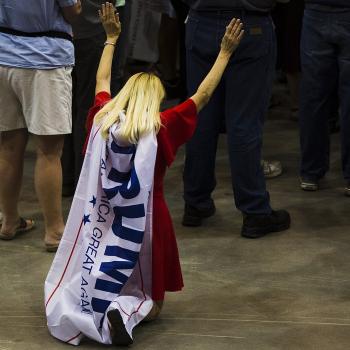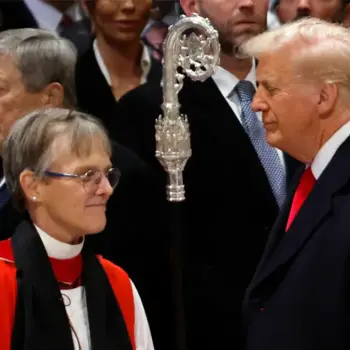We are still many weeks away from early November and I’m already wondering if there is anything left to say about this election, which the Nebraska Senator Ben Sasse memorably described as a “dumpster fire.” (I confess that I didn’t know that this was a phrase until I looked it up and learned that it has the meaning of “a complete disaster” or “something very difficult that nobody wants to deal with.”)
Recently, however, I’ve found one small glimmer of light in the larger darkness: this election cycle offers a welcome opportunity for teaching about modern ethical theory. If I may generalize: modern ethics has been dominated by two major schools of thought: the so-called Kantian or deontological (or “rule based”) school and that of consequentialism. The former seeks to define rationally defensible rules of moral action, irrespective of the moral agent’s time, place, and historical circumstance. The latter weighs the rightness or wrongness of actions on the basis of their perceived outcomes and effects on society.
If a Republican reasons that under no circumstances will she vote for Trump, she likely falls in the Kantian category. Some things—like throwing babies from skyscrapers–are simply wrong, pure and simple, irrespective of the consequences–even if, say, a mass murderer promised you that he would spare ten adult lives for every baby thrown. From this standpoint, not voting for Trump is a refusal to throw the baby no matter what. Period. But if one reasons—as many have—that a vote for Trump, however repugnant, is still better than the consequences of (another) Clinton presidency, then one falls in the utilitarian camp. In this camp, clear-cut choices often do not exist, and one must frequently choose the lesser of two evils. If you can’t maximize the good, you can at least minimize the bad. Both of these theories command respect among ethical theorists, but, sadly, when flesh-and-blood exponents of the two theories come into conversation, they usually end up talking past one another, because they begin from largely incommensurate premises.
There is, however, another school of thought that has gained salience in recent years: that of “virtue ethics,” the best known representative of which is probably the philosopher Alasdair MacIntyre, although its modern genealogy goes back to the British philosopher Elizabeth Anscombe and its deeper roots lead back to Aristotle. In contrast to the other two camps, virtue ethics places particular stress on the inner state of the moral actor, the predisposition of the individual or the community to act in virtuous patterns on the basis of cultivated knowledge about what constitutes human excellence or flourishing (in the Aristotelian sense of Eudaimonia). With consequentialists, virtue ethicists are concerned about the broader social outcomes of actions, but they place more emphasis on the intellectual and behavioral disposition, the cultivated ethical habits, of the moral agent—the person trying to know and do the good. With Kantian-deontologists, virtue ethicists are not moral relativists, but they are more skeptical that ethics can be rationally codified once and for all; experience, common sense, and the complexity of things human suggest the difficulty of this desirable enterprise.
Many Christians thinkers, influenced by virtue ethics in recent years, have sought to recover the seven traditional virtues of premodern Christian thought: the classical or cardinal virtues of prudence, justice, courage, and temperance; and the Christian or theological virtues of faith, hope, and love (cf. I Corinthians 13). While one would do well not to see this an exhaustive list, many wise heads have judged it an able template for the moral life. Dante in his Commedia, for instance, encounters the seven virtues, allegorized as heavenly nymphs, just before the appearance of Beatrice, the symbol of divine love. In more recent times, the Neo-Thomist philosopher Josef Pieper has eloquently and succinctly articulated the template of the virtues:
First: the Christian is one who, in faith, becomes aware of the reality of the triune God. Second: the Christian strives, in hope, for the total fulfillment of his being in eternal life. Third: the Christian directs himself, in the divine virtue of love, to an affirmation of God and neighbor that surpasses the power of any natural love. Fourth: the Christian is prudent; namely he does not allow his view on reality to be controlled by . . . his will, but rather he makes . . . [his] will dependent upon the truth of real things. Fifth: the Christian is just; that is, he is able to live “with the other” in truth. . . . Sixth, the Christian is brave, that is, he is prepared to suffer injury and, if need be, death for the truth. . . . Seventh: the Christian is temperate; namely he does not permit his . . . desire for pleasure to become destructive and inimical to his being.
So how might a virtue ethicist size up the current election? She would ask of Trump: does he exhibit the virtues in his private and public life? She would ask of Clinton; does she exhibit the virtues in public and private life? And, not least, she would ask of the American society that has produced the choices for this election: does it evince the virtues?
The answers might vary from individual to individual, to be sure. But I suspect many, despondent and frustrated, would still find themselves concurring with Sasse: we simply have a raging dumpster fire on our hands—and one, curiously, emitting blistering heat and practically no light.
Thomas Albert Howard is professor of humanities and history and holder of the Duesenberg Chair in Ethics at Valparaiso University.

















